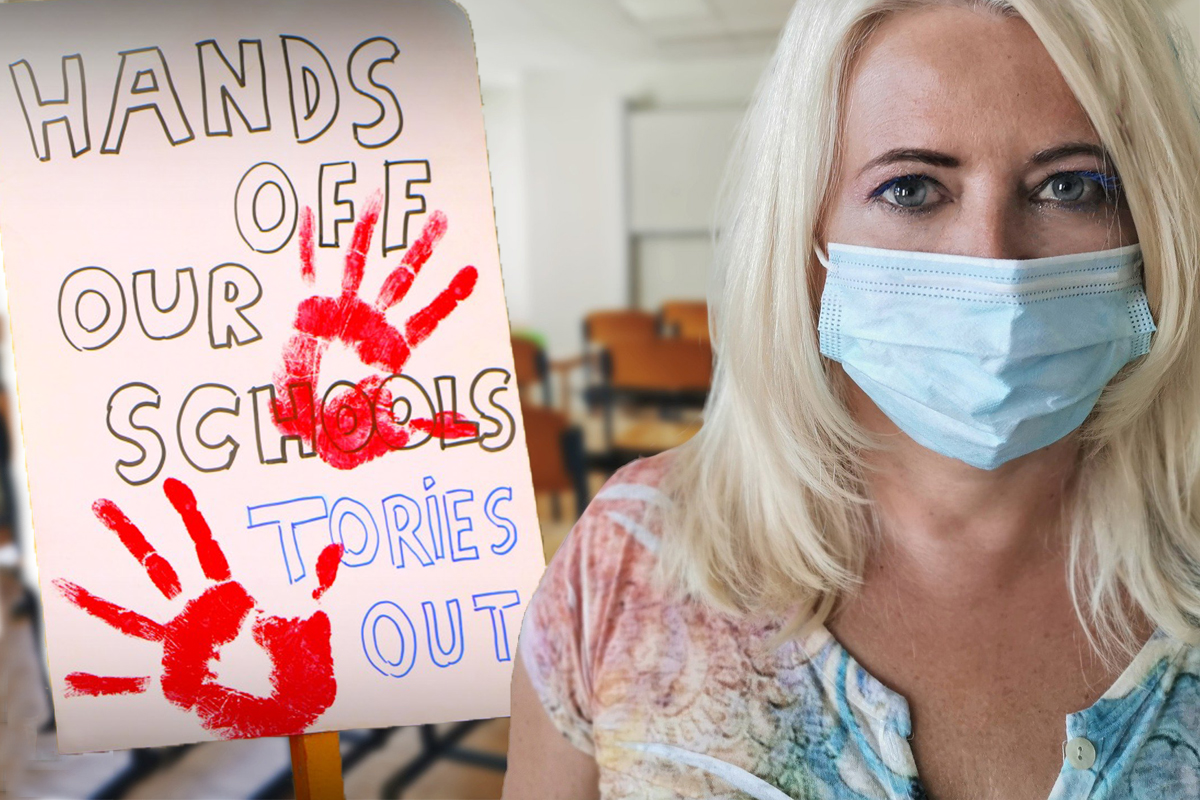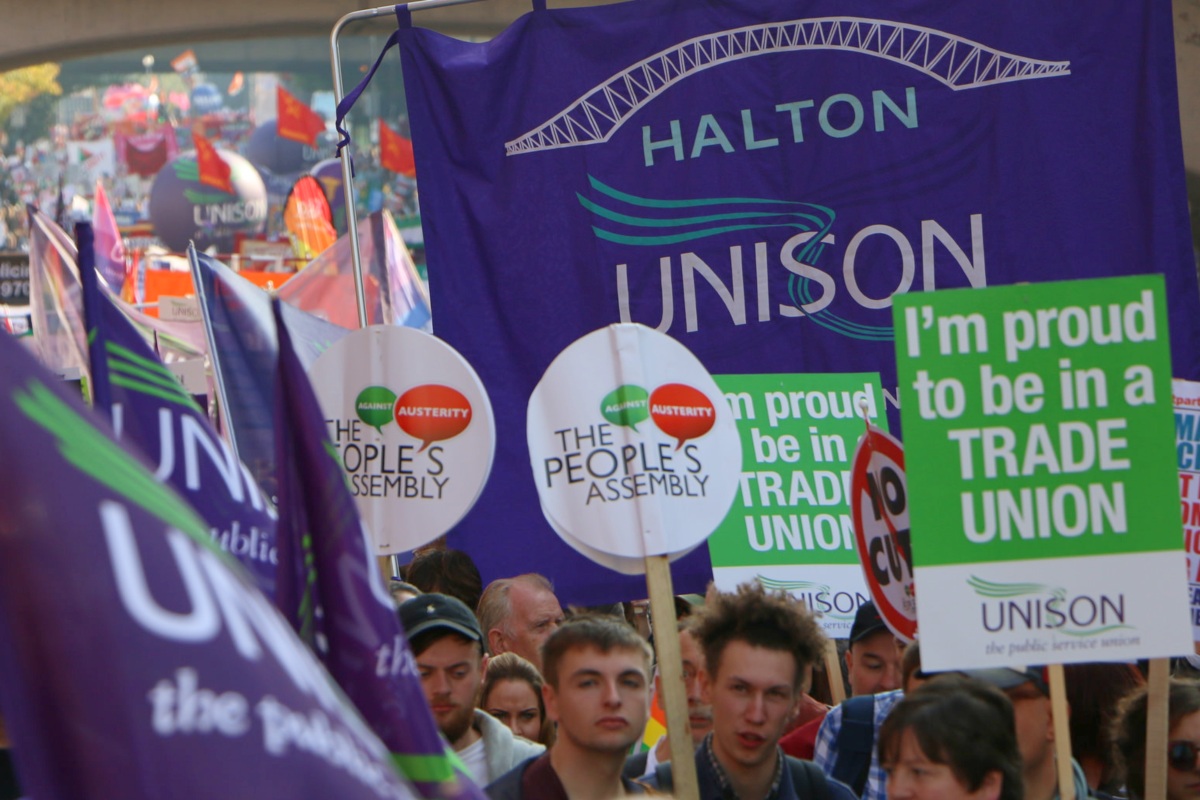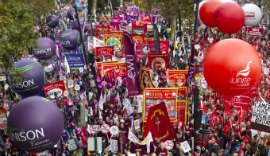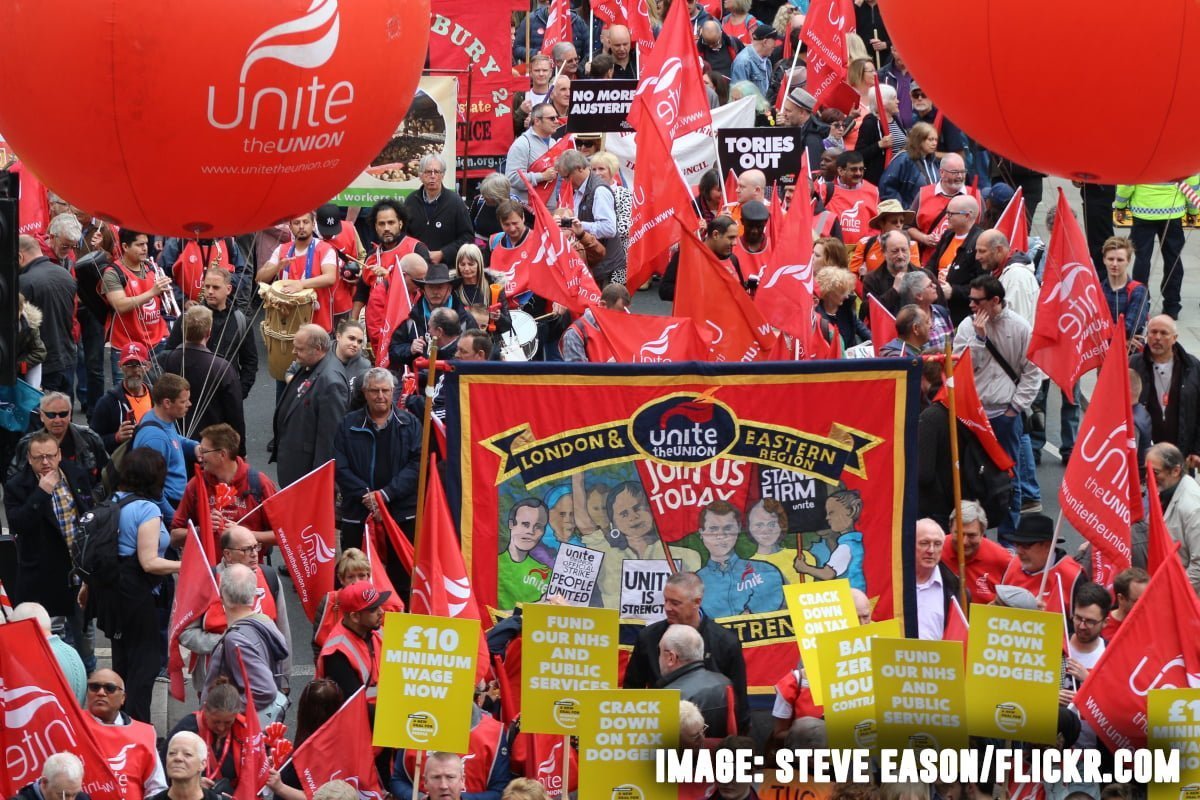A wave of strikes is spreading across Britain, as the bosses and Tories attempt to push further attacks and austerity. To defend itself, the working class needs a fighting leadership, militant action, and socialist policies.
2020 was an extremely challenging year for the working class, both internationally and in Britain. But 2021 is likely to see even sharper struggles. While COVID vaccines are now being haphazardly rolled out to deal with the immediate public health catastrophe, the global capitalist crisis that has been triggered by the virus runs on unchecked.
Everywhere, the story is the same. With Chancellor Rishi Sunak pledging to “balance the books”, and the Tories looking to appease the bosses by ripping up workers’ rights, it is clear that a new wave of austerity and attacks is on the cards.
Public sector workers will see their pay frozen. The dire financial situation in local government will put the jobs of thousands of council workers under threat. And no doubt the bosses will go on the offensive in the private sector, in an attempt to make workers pick up the bill for the coronavirus crisis.
Workers therefore face an assault on all fronts: on jobs; on wages; on conditions; and on the public services. Many have already been made redundant. Millions more will likely join them in the dole queue when state aid is eventually withdrawn and the government’s furlough scheme is wound up.
While the biggest monopolies have scooped up even more wealth than before, workers have been forced to shoulder the cost. Even measures to avoid mass unemployment, such as the furlough scheme, will eventually have to be paid back. We all know who will be asked to pay in this scenario, and it won’t be the bosses.
Boiling point
 There are two sides to this story, however. The capitalists will certainly go on the attack, attempting to make employees work harder and longer, for less pay, in an effort to squeeze as much profit out of them as possible. But workers can only be put under so much pressure before their resentment and anger boils over.
There are two sides to this story, however. The capitalists will certainly go on the attack, attempting to make employees work harder and longer, for less pay, in an effort to squeeze as much profit out of them as possible. But workers can only be put under so much pressure before their resentment and anger boils over.
Much of this process takes place below the surface. With every imposition by the bosses, anger builds up. Eventually, this has to find an outlet. And at that point, even a seemingly secondary question can spark off a mass walkout or protest.
After years of attacks on the working class, we are beginning to see this boiling point being reached in many workplaces and industries across Britain.
Construction showdown
In construction, many workers have been forced to work throughout the pandemic on sites that are breeding grounds for infection, with minimal safety precautions.
Unite the Union is the biggest organiser in the construction industry, and its members in this sector have a proud history of militant action. They showed they were prepared to fight when the Joint Industry Board tried to impose pay cuts of 35% back in 2012-2013 – and history could well be about to repeat itself.
Construction bosses have demanded a pay freeze. But this has been decisively rejected by union members. The stage is therefore set for a bitter showdown.
Education set to explode
 In the education sector, tensions have been high ever since the government ordered schools to open following the summer holidays. Several local branches of the NEU – such as the ones covering Colvestone Primary and Thomas Fairchild community schools – have already begun the balloting process for strike action.
In the education sector, tensions have been high ever since the government ordered schools to open following the summer holidays. Several local branches of the NEU – such as the ones covering Colvestone Primary and Thomas Fairchild community schools – have already begun the balloting process for strike action.
Nationally, at the beginning of January, the NEU held an online meeting of 400,000 of its members, in which it advised teachers to refuse to return to work if safety couldn’t be guaranteed. This threat – essentially of unofficial strike action – forced the Tories into yet another screeching U-turn, with remote learning now in place until at least the mid-February half-term.
But unless this time is used to actually make schools safe for reopening, then nothing will fundamentally have been solved. Instead of listening to the suggestions of the teaching unions, the Tories are looking to pick a fight with them. This is an extremely combustible cocktail, which is ready to explode.
Council cuts
In the public sector, Unison represents over a million workers across the NHS and local government. Right-wing candidate Christina McAnea won the recent election for Unison general secretary. But the strong vote for Paul Holmes and the left shows the potential for dramatic changes inside the union, especially with the NEC elections coming up.
With the NHS in the midst of an historic crisis, and with public sector workers under attack across the board, the new Unison leadership will be under pressure to call for action. Members will not be willing or able to accept any more compromises or half-measures.
Already, Unison members in higher education are mobilising against an insulting 0% pay offer. Meanwhile, in local government the next round of bankruptcies and cuts will push council workers into defending themselves.
This has already been the case in Tower Hamlets, where the council has used fire-and-rehire tactics to hack apart terms and conditions for the staff. Similarly, Croydon Council now looks to emulate this strategy, following a declaration of bankruptcy.
Industrial battles
In what remains of Britain’s industries, the battle has already begun. As we have reported previously, for example, workers at the Barnoldswick Rolls Royce factory have undertaken strike action in order to defend themselves against the threat of mass redundancies.
A week-long strike quickly spiralled into a much larger struggle, as the bosses responded with a lockout. But this only fuelled the workers’ determination to fight. And thanks to their bold action, the workers have been successful in saving the factory, along with 350 jobs.
The transport and logistics sector has also seen escalating action, with DHL workers taking strike action, only for management to bring in the police in an attempt to remove pickets blocking depots.
Elsewhere, CWU members at BT have successfully balloted for strike action to defend their jobs, smashing through Tory-imposed turnout thresholds in the process. Workers at Heathrow Airport are engaged in a long-running dispute to defend pay and conditions. And British Gas engineers have walked out in response to the fire-and-rehire tactics used by the bosses there.
Fires of struggle
 These cases are just the tip of the iceberg. The examples could go on and on. From healthcare to higher education: virtually every section of the working class is being targeted by the bosses and the Tories. But workers are reaching the end of their tether, and are beginning to mobilise in response.
These cases are just the tip of the iceberg. The examples could go on and on. From healthcare to higher education: virtually every section of the working class is being targeted by the bosses and the Tories. But workers are reaching the end of their tether, and are beginning to mobilise in response.
The strikes, ballots, and other industrial unrest seen last year is only the beginning. Society is creaking at the seams. Explosive conditions are being prepared across the board. Any spark could quickly ignite all this highly flammable material, leading to wildfires of struggle spreading.
While most of these struggles will likely occur on a local or regional level, the best defence is a bold offence. The specifics of the situation inside industries and businesses may vary wildly, but the general picture – of attacks on jobs, wages, and conditions – is the same for workers everywhere.
This calls for these struggles to be linked and joined-up; for united and coordinated action from the unions. The TUC was formed to organise the unions in such a way – to provide strength through unity. Now is the time for them to do exactly that.
Coordinated action
 Firstly, this means organising solidarity and support for any workers moving into action against the bosses. Secondly, it means coordinating strike action – particularly, at the present time, in the form of a one-day public sector strike against the pay freeze and cuts being implemented by the Tories as part of their latest package of austerity.
Firstly, this means organising solidarity and support for any workers moving into action against the bosses. Secondly, it means coordinating strike action – particularly, at the present time, in the form of a one-day public sector strike against the pay freeze and cuts being implemented by the Tories as part of their latest package of austerity.
With the Tory government looking to set workers’ rights alight in the wake of Brexit, there is also scope to expand such a strike into the private sector.
Such a move would help to galvanise workers, showing the potential power of the labour movement, and giving workers confidence to take further action against the Tories and the bosses.
This, in turn, must be followed up with a mass drive to recruit and organise workers into the unions – particularly those in the most precarious sectors and workplaces, who often face the most exploitative conditions and the lowest pay.
Socialist fightback
 Finally, the leaders of the trade union movement should be generalising these economic demands and industrial struggles into a bold socialist political programme.
Finally, the leaders of the trade union movement should be generalising these economic demands and industrial struggles into a bold socialist political programme.
Rather than cosying up to Rishi Sunak and the CBI [the bosses’ union], the TUC should be organising a mass campaign in defence of jobs. Instead of class collaboration in the ‘national interest’, we need militant action, linked to demands for a socialist alternative.
The means fighting for the nationalisation of the major monopolies, under workers’ control, so that production can be democratically and rationally planned in the interests of society, along socialist lines.
Instead of closures and job cuts, work should be shared out, with a reduction in the working week and no loss of pay. And with the establishment of workers’ committees, workers themselves would have the power to ensure that workplaces are kept safe – throughout this pandemic, and beyond.
This is what the union leaders should be calling for in order to ensure that workers are not made to pay for this crisis of capitalism. Enough is enough. We need a militant fightback.






